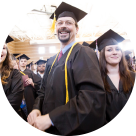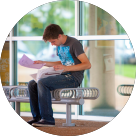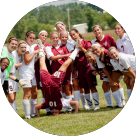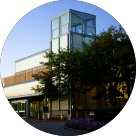Recently Visited Pages
Take advantage of this at-a-glance look at the pages on the SCC website you most often visit. Use this as a tool to navigate quickly to info you need the most. Take it one step further and click the star in the top right corner to ensure your favorite pages remain on your list of Visited Pages.
News
SCC reduces need for remedial math courses, saving students time and money and aiding in degree competition
Published: 11/16/2015
High school students who reach their math requirements by junior year are opting out of math their senior year, not realizing the impact it can have on their college education – placing into a lower class than expected or not passing their first college-level math class.
More than two thirds of community college students take at least one remedial course to prepare for college-level work, according to the American Association of Community Colleges.
“For the majority of students, mathematics is the highest hurdle they have to clear to complete their degree,” said Chris Breitmeyer, vice president for academic and student affairs at St. Charles Community College.
SCC implemented the Achieving Success in College Math program after exploring the correlation between high school math and success in college math. “The program sets students on the right path to be successful in college-level mathematics and higher education as a whole,” Breitmeyer said.
Through the program, funded by the SCC Foundation, SCC math faculty visit high schools within St. Charles County and SCC’s extended five-county service area, encouraging students to take math their senior year and providing them with information about what is expected in college-level math.
“We go directly to the individuals who can make the greatest difference in college placement – the students themselves,” said Joyce Lindstrom, Ed.D., SCC math professor.
Students receive a booklet with college and career readiness tips, and they learn that students who take math in their senior year of high school have a higher placement/assessment score on average than those who did not, according to SCC Math Department data.
“Toward the end of the program, the high school students take a very short assessment test and are unofficially placed into a math class,” said Jackie Radle, SCC math instructor. “It makes everything very real for them. Students are not prepared for the test and usually do not do great. It is easy to demonstrate why they need to prepare.”
The program gives students the knowledge to make the decisions in high school that will ultimately save their time and money while in college. Most importantly, the program’s success means that more students will persist in college and complete a degree.
The program began in 2008 with just 888 students hearing the message. To date, more than 26,000 area high school students have benefited from SCC’s Achieving Success in College Math program.
The success of students who have taken part has demonstrated the program’s measurable benefit.
A reported 83 percent of the students who heard the presentation placed into Beginning Algebra (MAT 098) or above, while only 50 percent of the students who did not hear placed at that level. Additionally, 31 percent of those who heard the presentation placed into at least Intermediate Algebra (MAT 121), the first level of SCC math courses that awards college-level credit, while only 16 percent of those who did not hear the presentation placed in MAT 121.
Students who heard the presentation are also proving to be more successful in their first SCC math class. More of them chose to take math their first semester at SCC (82.8 percent compared to 70.2 percent), and more passed with an A, B or C (48.7 percent compared to 39.9 percent).
Not only has the program benefited students, it has saved SCC more than $200,000 by offering fewer remedial math courses between the summer 2011 and spring 2015 terms.
“We love this program,” said Erin Coleman, Fort Zumwalt East High School math teacher. “It is eye opening for some students. Reality is, working hard now will pay off in the end, and we have students who need to hear this.”









